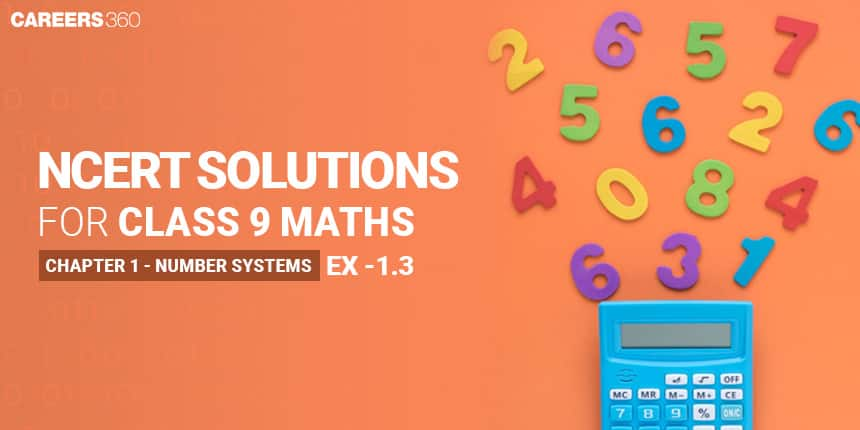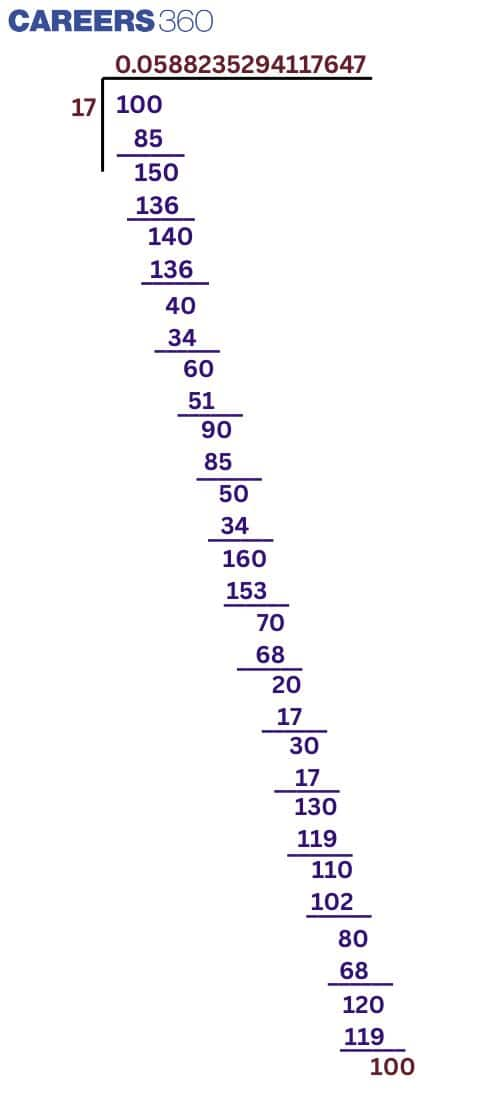ALLEN Coaching
ApplyRegister for ALLEN Scholarship Test & get up to 90% Scholarship
Real number decimal expansions serve as essential knowledge for understanding differences between rational and irrational quantities. Decimals revealing the expression of

In order to understand number classifications better students should consult NCERT Solutions alongside using NCERT Books that include multiple practice problems and detailed explanations. The described resources enable students to recognize decimal expansion patterns while developing better skills in accurate number classification. These educational resources develop essential knowledge which students need when moving toward advanced mathematics concepts.
Q1 (i) Write the following in decimal form and say what kind of decimal expansion each has : (i)
Answer:
Since the decimal expansion ends after a finite number of steps. Hence, it is terminating
Q1 (ii) Write the following in decimal form and say what kind of decimal expansion each has : (ii)
Answer:
Since decimal expansion repeats itself so it is a non-terminating recurring decimal expansion.
Q1 (iii) Write the following in decimal form and say what kind of decimal expansion each has : (iii)
Answer:
Since the decimal expansion ends after a finite number. Therefore, it is terminating
Q1 (iv) Write the following in decimal form and say what kind of decimal expansion each has : (iv)
Answer:
Since decimal expansion repeats itself so it is a non-terminating recurring decimal expansion.
Q1 (v) Write the following in decimal form and say what kind of decimal expansion each has: (v)
Answer:
Since decimal expansion repeats itself so it is a non-terminating recurring decimal expansion.
Q1 (vi) Write the following in decimal form and say what kind of decimal expansion each has : (vi)
Answer:
Since decimal expansion ends after finite number of figures. Hence, it is terminating.
Answer:
Yes, the decimal expansion of 1/7 is:
So for other multiples:
All are cyclic permutations of the repeating part 142857.
Q3 (i) Express the following in the form
Answer:
Let x =
Then 10x = $6.\overline{6}$
Subtract:
10x - x = $6.\overline{6}$ - $0.\overline{6}$
Hemce,
Q3 (ii) Express the following in the form
Answer:
Let x =
Then 100x =
Subtract:
Let x = 0.477777...
Or x = 0.47 + 0.00777...
Now:
Let y = 0.00777... =
Now write y as:
Y =
So:
Hence,
Q3 (iii) Express the following in the form
Answer:
Let
Then
We can write as:
After Subtraction:
Therefore,
Q4 Express 0.99999 .... in the form
Answer:
Let x =
⇒ 10x =
⇒ 10x - x = 9
⇒ 9x = 9 ⇒ x = 1
So, 0.9999… = 1
Yes, it’s surprising but mathematically correct. The difference between 1 and 0.999… is infinitely small — effectively zero.
Answer:
Performing the division:

1 ÷ 17 = 0.0588235294117647… → Repeats after 16 digits
So, maximum repeating block length = 16
Answer:
We can observe that when q is 2, 4, 5, 8, 10… then the decimal expansion is terminating. For example:
Therefore,
It is evident that when the denominator of the given fractions is prime factorized to a power of either 2 or 5, or both, the terminating decimal can be attained.
Q7 Write three numbers whose decimal expansions are non-terminating non-recurring.
Answer:
Three numbers whose decimal expansions are non-terminating non-recurring are
1) 0.02002000200002......
2) 0.15115111511115.......
3) 0.27227222722227.......
Q8 Find three different irrational numbers between the rational numbers
Answer:
And
Therefore, three different irrational numbers between the rational numbers
1) 0.72737475....
2) 0.750760770780...
3) 0.790780770760....
Q9 (i) Classify the following numbers as rational or irrational :
Answer:
Writing
Since, the decimal expansion of the number obtained is non-terminating and non-recurring. It is an irrational number.
Q9 (ii) Classify the following numbers as rational or irrational :
Answer:
Writing
It is clear that it is a rational number because we can represent it in
Q9 (iii) Classify the following numbers as rational or irrational : 0.3796
Answer:
Writing 0.3796 in fraction form, we get:
It is clear that it is a rational number as the decimal expansion of this number is terminating and we can also write it in
Q9 (iv) Classify the following numbers as rational or irrational : 7.478478....
Answer:
We can rewrite 7.478478.... as
Now, as the decimal expansion of this number is non-terminating recurring. Therefore, it is a rational number.
Q9 (v) Classify the following numbers as rational or irrational : 1.101001000100001...
Answer:
In the case of number 1.101001000100001...
It can be observed that the decimal expansion of this number is non-terminating and non-repeating. Therefore, it is an irrational number.
Also Read:
Check Out-
Students must check the NCERT solutions for class 9 of Mathematics and Science Subjects.
Students must check the NCERT Exemplar solutions for class 9 of Mathematics and Science Subjects.
Irrational numbers are numbers that cannot be stated in the form of a fraction with an integer in both the numerator and the denominator.
root(49)=7 which can be written as 7/1
Thus 49 is a rational number.
Yes 0 is a rational number (since 0 can be written as 0/1 , 0/2 etc… )
Decimal numbers are classified into
Recurring Decimal Numbers (repeating or Non-Terminating Decimals)
Non-Recurring Decimal Numbers (non Repeating or Terminating Decimals).
The expanded form of 64.3 is 60+4+3/10.
Yes, 0.033 is a non-recurring decimal number. Since 0.033 is a non Repeating and Terminating number.
The dot which is present in between the whole number and fractions part is known as the decimal point.
Admit Card Date:06 May,2025 - 20 May,2025
Admit Card Date:06 May,2025 - 20 May,2025
Application Date:07 May,2025 - 17 May,2025

Register for ALLEN Scholarship Test & get up to 90% Scholarship

Get up to 90% Scholarship on Offline NEET/JEE coaching from top Institutes

This ebook serves as a valuable study guide for NEET 2025 exam.

This e-book offers NEET PYQ and serves as an indispensable NEET study material.
As per latest 2024 syllabus. Physics formulas, equations, & laws of class 11 & 12th chapters
As per latest 2024 syllabus. Chemistry formulas, equations, & laws of class 11 & 12th chapters